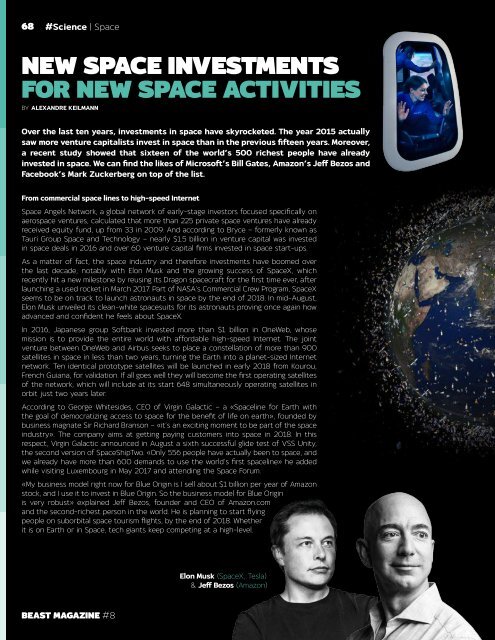Magazine_BEAST_2017_Edition_8_complet
You also want an ePaper? Increase the reach of your titles
YUMPU automatically turns print PDFs into web optimized ePapers that Google loves.
68<br />
#Science | Space<br />
NEW SPACE INVESTMENTS<br />
FOR NEW SPACE ACTIVITIES<br />
BY ALEXANDRE KEILMANN<br />
Over the last ten years, investments in space have skyrocketed. The year 2015 actually<br />
saw more venture capitalists invest in space than in the previous fifteen years. Moreover,<br />
a recent study showed that sixteen of the world’s 500 richest people have already<br />
invested in space. We can find the likes of Microsoft’s Bill Gates, Amazon’s Jeff Bezos and<br />
Facebook’s Mark Zuckerberg on top of the list.<br />
From commercial space lines to high-speed Internet<br />
Space Angels Network, a global network of early-stage investors focused specifically on<br />
aerospace ventures, calculated that more than 225 private space ventures have already<br />
received equity fund, up from 33 in 2009. And according to Bryce – formerly known as<br />
Tauri Group Space and Technology – nearly $1.5 billion in venture capital was invested<br />
in space deals in 2016 and over 60 venture capital firms invested in space start-ups.<br />
As a matter of fact, the space industry and therefore investments have boomed over<br />
the last decade, notably with Elon Musk and the growing success of SpaceX, which<br />
recently hit a new milestone by reusing its Dragon spacecraft for the first time ever, after<br />
launching a used rocket in March <strong>2017</strong>. Part of NASA’s Commercial Crew Program, SpaceX<br />
seems to be on track to launch astronauts in space by the end of 2018. In mid-August,<br />
Elon Musk unveiled its clean-white spacesuits for its astronauts proving once again how<br />
advanced and confident he feels about SpaceX.<br />
In 2016, Japanese group Softbank invested more than $1 billion in OneWeb, whose<br />
mission is to provide the entire world with affordable high-speed Internet. The joint<br />
venture between OneWeb and Airbus seeks to place a constellation of more than 900<br />
satellites in space in less than two years, turning the Earth into a planet-sized Internet<br />
network. Ten identical prototype satellites will be launched in early 2018 from Kourou,<br />
French Guiana, for validation. If all goes well they will become the first operating satellites<br />
of the network, which will include at its start 648 simultaneously operating satellites in<br />
orbit just two years later.<br />
According to George Whitesides, CEO of Virgin Galactic – a «Spaceline for Earth with<br />
the goal of democratizing access to space for the benefit of life on earth», founded by<br />
business magnate Sir Richard Branson – «it’s an exciting moment to be part of the space<br />
industry». The company aims at getting paying customers into space in 2018. In this<br />
respect, Virgin Galactic announced in August a sixth successful glide test of VSS Unity,<br />
the second version of SpaceShipTwo. «Only 556 people have actually been to space, and<br />
we already have more than 600 demands to use the world’s first spaceline» he added<br />
while visiting Luxembourg in May <strong>2017</strong> and attending the Space Forum.<br />
«My business model right now for Blue Origin is I sell about $1 billion per year of Amazon<br />
stock, and I use it to invest in Blue Origin. So the business model for Blue Origin<br />
is very robust» explained Jeff Bezos, founder and CEO of Amazon.com<br />
and the second-richest person in the world. He is planning to start flying<br />
people on suborbital space tourism flights, by the end of 2018. Whether<br />
it is on Earth or in Space, tech giants keep competing at a high-level.<br />
Elon Musk (SpaceX, Tesla)<br />
& Jeff Bezos (Amazon)<br />
<strong>BEAST</strong> MAGAZINE #8

















